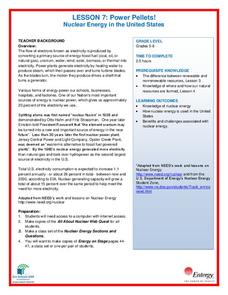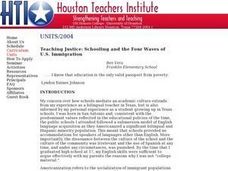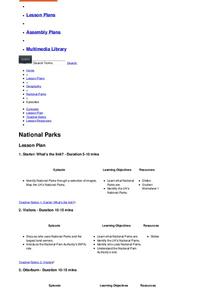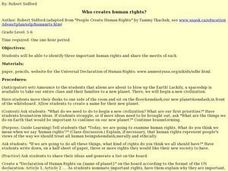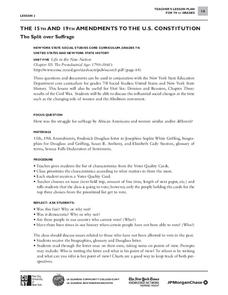Agriculture in the Classroom
Growing a Nation (1950-1969): Prosperity & Challenges: The Story of American Agriculture
A wonderful instructional activity on the development and impact of mechanized farming! History or agriculture classes learn the historical background of the United States' food production by creating a pamphlet with information on the...
National Wildlife Federation
Power Pellets! Nuclear Energy in the United States
Nuclear power provides about 20 percent of the energy generated in the United States. The seventh activity in the series of 12 tackles nuclear power. After sharing what they know about nuclear energy, scholars complete a WebQuest make a...
National WWII Museum
What It Takes to Win: Mapping Primary Source Evidence
World War II was not just waged in Europe and Asia; the home front was key to Allied victory. Using newspaper clippings from World War II and a map, scholars plot out wartime production in the United States. After that, class members...
Library of Congress
Thomas Jefferson's Library: Making the Case for a National Library
The United States Library of Congress, the largest library in the world. But such was not always the case. The library was destroyed during the War of 1812. In a persuasive letter to Samuel H. Smith, Thomas Jefferson offered to sell his...
Curated OER
The People and Philosophy Behind Our National Parks: A Biographical Curriculum Unit
Students discover the interaction of American Literature, politics and the environmental movement. They explore the changing concept and philosophy of wilderness, and explain the development of The National Park System. They read...
Curated OER
Teaching Justice: Schooling and the Four Waves of U.S. Immigration
U.S. immigration is the focus of a unit on social justice. Over the course of a school year, young historians read a variety of texts to learn about four waves of immigration that have occurred over time in the U.S. An emphasis on...
Curated OER
Oil Dependency Among Nations
Students research oil dependency amongst different nations in the world. In this oil dependency lesson plan, students use maps to locate oil sources, consider government actions on oil, and predict U.S. oil dependency.
Curated OER
The United States Flag
Students discover the meaning and symbolism behind the American flag. In this lesson on National symbols, students design a flag for their school, explain the symbolism they used, and distinguish the elements that constitute the US Flag....
Curated OER
Planet Earth: Almost 6 Billion Served
Students investigate the global population explosion, by comparing India's and China's population control efforts and results. They interpret the UN's Human Development Report, and conduct research on another highly-populated country.
Curated OER
What is a National Forest
Students select and research a National Forest near their local community. They read and discuss the pamphlet "A Guide To Your National Forests," view photos of national forests, conduct Internet research, and complete the student...
Curated OER
National Parks
Young scholars explore the National Parks of the United Kingdom. In this National Park Authority lesson, students investigate the structure of the parks system and find out how the Otterburn Training Area is used. Young scholars then...
Curated OER
Mangrove Loss Faster than Land-Based Forests
Students explore the reasons Mangrove forests are in jeopardy. In this lesson, students read an article that discusses specific facts on Mangrove forests, then complete numerous activities that reinforce the information, such as taking...
Curated OER
Who Creates Human Rights?
Students examine the importance of human rights. They participate in a simulation of starting a new civilization on another planet, create a class "Declaration of Human Rights," and write a journal entry based on class discussion...
Vietnam Unit III: Student Learning Outcomes (2016)
Overview of Unit III Vietnam War and Peace course, focusing on the transition from Eisenhower to the Kennedy administrations. Students (8-12+) will understand the key geopolitical and internal dynamics shaping Vietnam’s history...
Curated OER
Woodrow Wilson: Prophet of Peace
Learners read and discuss various speeches by Woodrow Wilson, and write and present a brief radio address that will persuade the nation to return to world peace. Students analyze current events and discuss whether the world has upheld...
Curated OER
The Supreme Court: The Judicial Power of the United States
Middle schoolers learn basic facts about the Supreme Court by examining the United States Constitution and one of the landmark cases decided by that court.
Advocates for Human Rights
U.S. Immigration Policy
The United States Immigration Policy is incredibly complex. To gain a deeper understanding of the criteria, quotas, preferences, and categories of immigrants admitted to the US, class members engage in a role playing activity that...
City University of New York
The 15th and 19th Amendments to the U.S. Constitution
Who gets to vote? Learn more about struggles for suffrage throughout United States history with a instructional activity based on primary source documents. Middle schoolers debate the importance of women's suffrage and African American...
Center for History and New Media
A Look at Virginians During Reconstruction, 1865-1877
The transition between rebellion to reunification was not smooth after the Civil War. Young historians compare primary and secondary source documents in a study of the Reconstruction era in Virginia, noting the rights that were not...
Channel Islands Film
A Time Capsule of a Lost Early California Lifestyle
After viewing The Last Roundup, a documentary that examines the transitioning of Santa Rosa from a privately owned island to a National Park, class members adopt the point of view of Tim Vail, a member of the family that once owned the...
Discovery Education
By the Foot: The History of Measurement
When is a foot not a foot? When you use the length of your own foot to measure distances, of course. To underscore the importance of standardized units of measurement, middle schoolers engage in a series of activities that ask them to...
PBS
Eleanor Roosevelt: First Lady, Diplomat, and Activist
Scholars analyze the impact Eleanor Roosevelt had on not just the nation, but also on the world. Primary sources and video clips help form a picture of the First Lady and her accomplishments. As a final activity, individuals create...
Curated OER
How Has the Constitution Shaped the Economic System in the United States?
Students examine the characteristics of market economies. In this United States economics lesson, students analyze the Constitution to understand how it contributes to the market economy established in the United States. Students also...
Curated OER
A House Divided: Slavery in the United States
Students explore the history of the United States and slavery. In this slavery lesson plan, students view primary sources, complete journal writing, view videos, and answer short answer questions.
Other popular searches
- Model United Nations
- The United Nations
- Israel and United Nations
- United Nations Test
- United Nations in Iraq
- United Nations Criticism
- United Nations Role
- United Nations Resolutions
- Nato, United Nations
- United Nations Assembly
- Nato United Nations
- The United Nations Lessons



